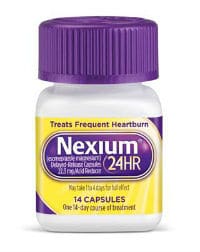
Free Confidential Lawsuit Evaluation: If you or a loved one was injured by Nexium, you should contact our law firm immediately. You may be entitled to compensation by filing a suit against the manufacturer and our lawyers can help.
Update: Louisiana Nexium Lawsuit Survives Motion to Dismiss
April 21, 2017 – A Louisiana woman who allegedly developed kidney failure after taking Nexium will be allowed to pursue defect and warning claims, after the judge overseeing the case turned back a defense bid to have the lawsuit dismissed. In an Order issued March 22, the judge upheld claims of defect in construction or composition and design defect, ruling that Plaintiff Alice Donald had sufficiently pled that Nexium was defective in formulation and that there were other safer heartburn medications available on the market.
What’s the Problem?
A study published in JAMA Internal Medicine on January 11, 2016, found that patients who took Nexium or other heartburn medication from the proton pump inhibitor (PPI) class twice per day were 46% more likely to develop chronic kidney disease (CKD) compared to patients who did not take the drugs. Those who used PPIs once a day had a 15% increased risk. Additionally, the researchers determined that PPI users had a 39% higher risk of CKD compared to patients who took H2 blocker heartburn drugs like Zantac.
It has previously been established that long-term PPI use can cause low serum magnesium levels. Magnesium is essential to kidney function, and it is possible that reduced levels of this vital mineral could lead to severe kidney damage.
CKD Stages
The stages of CKD are based on measured or estimated glomerular filtration rate (GFR), a calculation that determines how well the blood is filtered by the kidneys. The National Kidney Foundation’s Kidney Disease Outcomes Quality Initiative (KDOQI) classifies the 5 stages of chronic kidney disease as:
- Stage 1 (GFR 90+) – Normal kidney function but urine findings or other abnormalities point to CKD.
- Stage 2 (GFR 60-89) – Mildly reduced kidney function, and other findings characteristic of impending kidney disease.
- Stage 3 (3A = GFR 45-59; 3B = GFR 30-44) – Moderately reduced kidney function.
- Stage 4 (GFR 15-29) – Severely reduced kidney function.
- Stage 5 (GFR less than 15 or on dialysis) – Full-blown kidney failure (also referred to as end-stage renal disease or ERSD).
Kidney Disease Symptoms
CKD often goes undetected due to a lack of symptoms until its advanced stages, according to the National Kidney Center (NKC). However, there are 10 key symptoms that may indicate kidney failure:
- Changes in urination
- Swelling in the legs, ankles, feet, face or hands
- Skin Rash / Itching
- Leg, Back or Side Pain
- Metallic Taste in Mouth/Ammonia Breath
- Nausea / vomiting
- Feeling cold
- Shortness of breath
- Dizziness / trouble concentrating
- Fatigue
Treatment
In most patients, kidney failure is a gradual process that develops over a long period of time. For this reason, symptoms may not present until the disease is in its later stages. Kidney failure occurs when the kidneys are no longer able to remove waste and maintain fluid balance in the body. Without treatment, death will result. The 2 types of treatment for kidney failure are dialysis, the process of artificially eliminating wastes and unwanted fluid from the blood with the help of a machine, or kidney transplantation, a surgery done to replace the diseased kidney with a healthy kidney from a donor. Family members or others who are a good match may be able to donate one of their kidneys.
Are Proton Pump Inhibitors Overused?
The authors of the JAMA study noted above conceded that their findings do not indicate a casual link between proton pump inhibitor use and kidney disease. However, in an interview with The New York Times, the study’s lead author advised patients who took PPIs for a long period of time undergo routine kidney function monitoring.
“The study doesn’t prove that P.P.I.s cause kidney disease,” said Dr. Morgan E. Grams, a kidney specialist at Johns Hopkins and lead author of the study. “and we don’t want to cause alarm. P.P.I.s are great medicines, and sometimes lifesaving. But like all medications, there are risks and benefits. One approach for patients who require a long course of P.P.I.s would be to routinely monitor their kidney function.”
Study Links PPI Use to Kidney Damage
April 14, 2016 – Long-term PPI use may lead to an increased risk for kidney disease and kidney failure, according to a study published online today in the Journal of the American Society of Nephrology (JASN). Researchers found that 15% of PPI users were diagnosed with chronic kidney disease (CKD) compared to 11% of patients who took histamine H2 receptor blockers (Pepcid, Tagamet, Zantac). After calculating for variables, this translated to a 28% increased risk of CKD associated with proton pump inhibitor use. Only a few patients in the study — <0.2% — developed end-stage renal disease (ESRD), but the risk was 96% higher for those on PPIs.
Do I Have a Nexium Kidney Failure Lawsuit?
The Class Action Litigation Group at our law firm is an experienced team of trial lawyers that focus on the representation of plaintiffs in Nexium lawsuits. We are handling individual litigation nationwide and currently accepting new kidney failure cases in all 50 states.
Free Confidential Case Evaluation: Again, if you got kidney failure from Nexium, you should contact our law firm immediately. You may be entitled to compensation by filing a suit and we can help.
